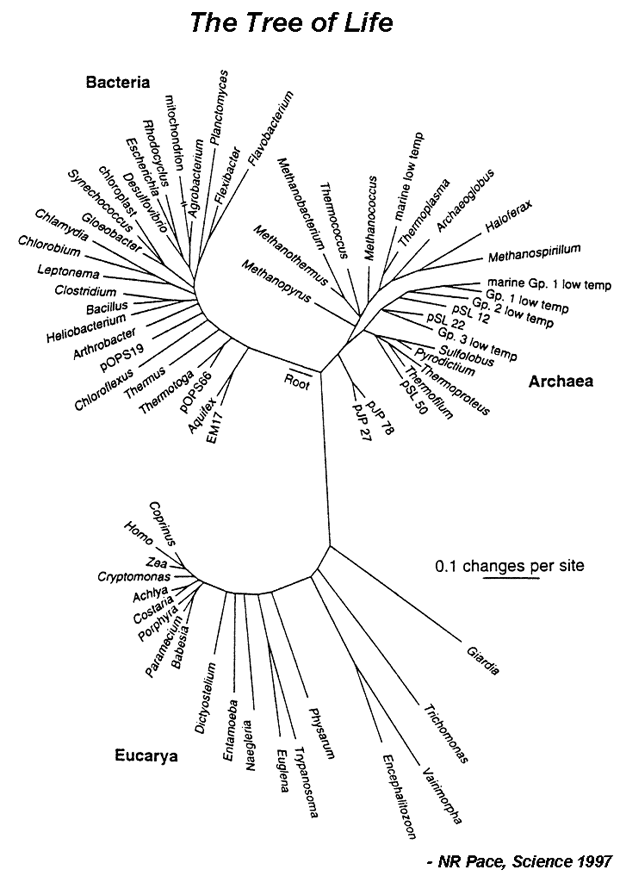book analysis
 Symbiotic Planet
Symbiotic Planet Navigating the site:
What coevolution actually reveals.
getting beyond our blinders | symbiosis | a new tree of descent | Darwin's vision | Gaia hypothesis | her purpose
![]()
"Planetary life survived at least three billion years before humanity was even the dream of a lively ape....We need to be freed from our species-specific arrogance."
p. 119.
How does Lynn Margulis make her points in the Introduction to Symbiotic Planet by each of these statements:
“If this book teaches you about symbiosis and the Gaia theory in the context of a radically new views of life, it is only because of four lucky facts.”
“This book is about planetary life, planetary evolution, and the ways our view of them are changing.
“Many circumstances conspire to extinguish scientific discoveries that discomfort our culture’s sacred norms.”
p. 2.
“Call the dominating inhibitions that determine our point of view whatever you wish. They affect all of us, including scientists.”
“One widely unstated assumption is the great chain of being. It defines the venerable position of humans as the exact center of the universe in the middle of the chain of being below God and above rock.”
“All beings alive today are equally evolved. All have survived over three thousand million years of evolution from common bacterial ancestors.”
p. 3.
getting beyond our blinders | a new tree of descent | Darwin's vision | Gaia hypothesis | her purpose

getting beyond our blinders | a new tree of descent | Darwin's vision | Gaia hypothesis | her purpose
Darwin's discoveries:
"As a species, we still fear the eccentric in our views of ourselves. Despite or perhaps because of Darwin, as a culture we still don’t really understand the science of evolution.”
“Most evolution occurred in those beings we dismiss as “microbes.” All life as we know it, evolved from the smallest life-forms of all, bacteria.”
"My claim is that, like all other apes, humans are not the work of God but of thousands and millions of years of interaction among highly responsive microbes.”p. 4.
"Land dwellers may owe their hold on dry ground to specific symbioses between plants and fungi."
p. 106.
getting beyond our blinders | a new tree of descent | Darwin's vision | Gaia hypothesis | her purpose
Gaia
"No evidence exists that are 'chosen' the unique species for which all others were made."
"belies or true status as upright mammalian weeds."
p. 119.
"Gaia is the regulated surface of the planet incessantly creating new environments and new organisms. But the planet is not human, nor does it belong to humans."
p. 120.
'...an Earthwide phenomenon: the regulation of temperature, acidity/alkalinity, and gas composition. Gaia is a series of interacting ecosystems that compose a single huge ecosystem at the Earth's surface.
"Life especially bacterial life is resilient. It has fed on disaster and destruction from the beginning."
Ibid.
"Piecing together evidence...
bacteria first removed the hydrogen they needed for their bodies directly from the air. Later they took up the hydrogen sulfide belched up from volcanoes. Eventually, blue-green bacteria wrenched hydrogen atoms from water. Oxygen was expelled as a metabolic waste product. This waste at first disastrous, eventually powered life's continued growth."p. 120.
"The cyanobacteria's waste became our fresh air."
"Gaia is the largest ecosystem on earth.… is the genius of recycling."
"Reactive gases. . . and various sulfur gases are detectable in the Earth's atmosphere because they are continuously produced by waste-producing life faster than they can react."
p. 121.
"The Gaia hypothesis is science. The surface of the planet, Gaia theory posits, behaves as a physiological system in certain limited ways. The aspects that are physiologically controlled include surface temperature and atmospheric composition of reactive gases, including oxygen, and pH or acidity and alkalinity."
"The plant's surface is not just physical, geological, and chemical, or even just geochemical. Rather it is geophysiological: it displays the attributes of a living body composed of the aggregate of the Earth's incessantly interactive life."
p. 123.
"'Weak Gaia' holds that the environment and life are coupled: they coevolve. Few disagree."
pp. 123-124.
"'Strong Gaia' states that the planet with its life, a single living system, is regulated in certain aspects by that life.–elicits the derision of certain biologists, especially those who call themselves neo-Darwinists. Led by Richard Dawkins of Oxford, these scientists reject the idea of a unified planetary system that has not evolved through natural selection with other planetary systems."
p. 124.
"The non-biological sciences do not suffice to explain the Earth's surface environment."
Ibid.
"We cannot put an end to nature; we can only pose a threat to ourselves."
p. 128.
![]()
What do her ideas tell us about the deeper significance of wilderness and wildness?
getting beyond our blinders | a new tree of descent | Darwin's vision | Gaia hypothesis | her purpose
Darwinian revolution's impacts
natural wealth of habitats, or settings.
Estuaries as a site of symbiotic relations
WEAL as a measure of habitat integrity, natural assets, and accounting for value.
getting beyond our blinders | a new tree of descent | Darwin's vision | her purpose
McKibben | Nash | Leopold | Stegner | Williams | Lewis Thomas | Ehrlich | Wilderness



